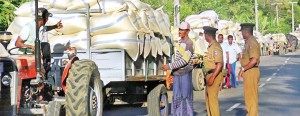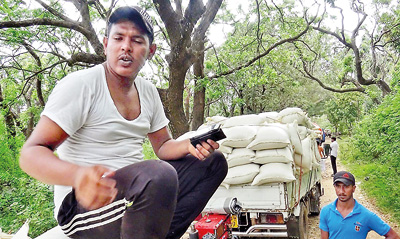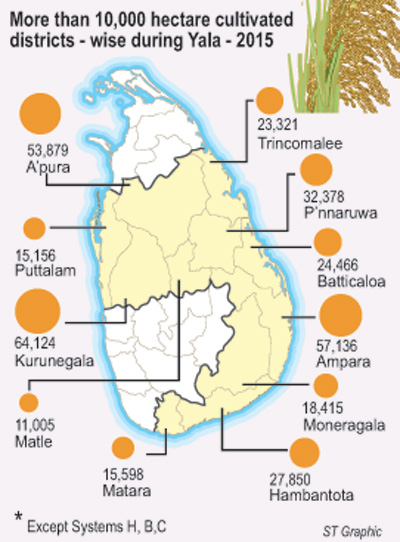News
Paddy price crisis: Farmers hit out at Mafia
Farmers in many parts of the country are angered and disappointed over the failure to set up an adequate mechanism to purchase their paddy, but authorities in turn blame them for disregarding instructions over the sale of their stock.

Farmers with paddy stacked into lorries and tractors lined up to sell their stocks. Pix by Kanchana Kumara Ariyadasa
This situation is widely prevalent in Matale, Ampara, Wilgamuwa, Anuradhapura and Eppawala and other areas, with long queues outside paddy purchasing points.
Farmers with paddy stacked inlorries and tractors lined up to sell their stocks to the Paddy Marketing Board (PMB) but had to spend two to three days before their produce was purchased, bearing the expense of Rs 3,000-3,500 a day for vehicle hire.
The problems were aggravated by a bumper paddy crop this season.
PMB Chairman M.B. Dissanayake admitted the delays had been partly caused by a lack of efficient personnel at the point of purchase.He hoped to carry out future purchases without inconveniencing farmers by using a mobile purchase service.
 “We have allocated specific days for farmers from each area so that it will not cause congestion, but farmers are not following the timetable given to them,” he explained in relation to the current situation.
“We have allocated specific days for farmers from each area so that it will not cause congestion, but farmers are not following the timetable given to them,” he explained in relation to the current situation.
Farmers are crowding the PMB which offers higher prices for paddy than private buyers.Although the Government announced that the guaranteed price for a kilo of nadu rice was Rs. 45 and samba Rs. 50, the open market price remains at Rs. 35-38 for nadu and Rs. 35-41 for samba. Farmers fear the price would fall further as harvesting continues.
“We have always bought only 6-7 percent of the paddy production each season even when the PMB was first established,” Mr. Dissanayake said.“Compared to the sown extent of Yala in 2014 and the average sown extent of the last five years the current sown extent is 60 percent and 23 percent higher than last year,” he said.

PMB chairman M.B. Dissanayake
“The government expected to buy 120,000 metric tonnes of paddy in the Yala season and hitherto we have bought 50,000 metric tonnes,” he said.The PMB chairman said Prime Minister Ranil Wickremesinghe had issued instructions to speed up paddy purchases.
On the Premier’s directive additional officers such as administration officers from the Divisional Secretariat office and field officers had been deployed to purchasing points where congestion occurred, to assist existing staff.
Former food security minister Gamini Jayawickrema Perera said the previous government had allocated Rs. 6 billion for the purchase of the Yala season paddy harvest from farmers islandwide, out of which Rs. 3 billion had already been spent.
The government expected to purchase all paddy stocks from farmers utilising private storage facilities where necessary.
“This occurred because the previous Maha paddy is still in the stores owned by the PMB. Although we tried to sell the rice by calling for tenders, private traders are quoting very low rates,” he said
“Consequently we are unable to purchase the Yala season paddy stocks without clearing the Maha season paddy stocks stored in the PMB’s repository. We expect to rent privately-owned storage space for paddy in the coming weeks to solve this problem,” Mr. Perera said.
 “We also urge farmers to utilise other PMB paddy stores facilities without going to stores that are already full,” he said.“We want to have a mechanism to sell the rice converted from paddy and clear the stocks stored in PMB granaries within the next few weeks,” Mr. Perera added.
“We also urge farmers to utilise other PMB paddy stores facilities without going to stores that are already full,” he said.“We want to have a mechanism to sell the rice converted from paddy and clear the stocks stored in PMB granaries within the next few weeks,” Mr. Perera added.
The former minister added that 175,000 metric tonnes of paddy were currently in stock at government storage facilities.“The paddy stocks of the farmers could be rejected due to the high moisture content – there should be no more than 14 per cent moisture content,” Mr. Perera added, raising more concerns. Harvesting during rains carried the risk of the paddy containing too much moisture.
All-Ceylon Farmers’ Association national organiser Namal Karunaratne said the Government had no proper mechanism to buy paddy harvests.He said his association did not oppose government officials checking for moisture content in paddy at the time of purchase but said farmers had no mechanism to remove moisture and even the Government lacked machinery for this purpose. Because of this, some farmers’ produce was rejected by the PMB.
“If the government has a stipulated price, why can’t this be legalised?” Mr. Karunaratne questioned. If the price was legalised, even if the Government did not buy the paddy it could not be bought by others at a lower rate.
The chairman of Parabowa Farmers Association, Rasika Premasiri, said that while retailers made huge profits farmers received only Rs. 22 per kilo of paddy. Retail rice traders earned 30-40 per cent profit against the wholesale price. Mr. Premasiri said the high price charged by retailers for rice was causing a downward trend in rice consumption and upward trend in wheat flour consumption.

